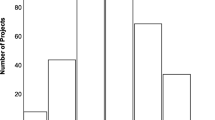Abstract
Based on the empirical analysis of data contained in the International Software Benchmarking Standards Group (ISBSG) repository, this paper presents software engineering project duration models based on project effort. Duration models are built for the entire dataset and for subsets of projects developed for personal computer, mid-range and mainframe platforms. Duration models are also constructed for projects requiring fewer than 400 person-hours of effort and for projects requiring more than 400 person-hours of effort. The usefulness of adding the maximum number of assigned resources as a second independent variable to explain duration is also analyzed. The opportunity to build duration models directly from project functional size in function points is investigated as well.
Similar content being viewed by others
Explore related subjects
Discover the latest articles, news and stories from top researchers in related subjects.References
Angelis L, Stamelos I, Morisio M. Building a software cost estimation model based on categorical data. In Proc. Seventh International Software Metrics Symposium, London, England, 2001, pp.4–15.
Boehm B W, Abts C, Chulani S. Software development cost estimation approaches. Annals of Software Engineering, 2000, 10(1–4): 177–205.
Briand L, Langley T, Wieczorek I. A replicated assessment and comparison of common software cost modeling techniques. In Proc. 22nd International Conference on Software Engineering (ICSE), Limerick, Ireland, 2000, pp.377–386.
Dolado J J. On the problem of the software cost function. Information and Software Technology, 2001, 43(1): 61–72.
Jeffery R, Ruhe M, Wieczorek I. A comparative technique of two software development cost modeling techniques using multi-organizational and company-specific data. Information and Software Technology, 2000, 42(14): 1009–1016.
Kitchenham B, Pfleeger S L, McColl B, Eagan S. An empirical study of maintenance and development estimation accuracy. Journal of Systems and Software, 2002, 64(1): 57–77.
Smith R, Hale J E, Parrish A S. An empirical study using task assignment patterns to improve the accuracy of software estimation. IEEE Transactions on Software Engineering, 2001, 27(3): 264–271.
Stewart B. Predicting project delivery rates using the naives-Bayes classifier. Journal of Software Maintenance and Evolution: Research and Practice, 2002, 14(3): 161–179.
Wieczorek I, Ruhe M. How valuable is company specific data compared to multiple-company data for software cost estimation. In Proc. Eighth IEEE Symposium on Software Metrics, Ottawa, Canada, 2002, pp.237–246.
Kitchenham B A, Pfleeger S L, Pickard L M et al. Preliminary guidelines for empirical research in software engineering. IEEE Transactions on Software Engineering, 2002, 28(8): 721–734.
Heemstra F J. Software cost estimation. Information and Software Technology, 1992, 34(10): 627–639.
Kitchenham B. Empirical studies of assumptions that underlie software cost-estimation models. Information and Software Technology, 1992, 34(4): 211–218.
Ferens D V. The conundrum of software estimation models. In Proc. IEEE Aerospace and Electronic Systems Magazine, 1999, pp.23–29.
Jones C. Software cost estimation in 2002. Crosstalk: The Journal of Defense Software Engineering, 2002, 15(6).
Jones C. Determining software schedules. Computer, 1995, 28(2): 73–75.
Park R E, Goethert W B, Webb J T. Software cost and schedule estimating: A process improvement initiative. Software Engineering Institute, Pittsburgh, U.S.A., 1994, http://www.sei.cmu.edu/pub/documents/94.reports/pdf/sr03.94.pdf.
Lokan C, Wright T, Hill P, Stringer M. Organizational benchmarking using the ISBSG data repository. IEEE Software, 2001, 18(5): 26–32.
Oligny S, Bourque P, Abran A. An empirical assessment of project duration models in software engineering. In Proc. 8th European Software Control and Metrics Conference ESCOM, Berlin, Germany, 1997.
Stensrud E, Foss T, Kitchenham B, Myrtveit I. An empirical validation of the relationship between the magnitude of relative error and project size. In Proc. Eighth IEEE Symposium on Software Metrics, Ottawa, Canada, 2002, pp.3–12.
D’Agostino R B, Belanger A, D’Agostino J. A suggestion for using powerful and informative tests of normality. The American Statistician, 1990, 44(4): 316–321.
Boehm B W. Software Engineering Economics. Prentice Hall, 1981.
Neder J W W, Kutner M. Applied Linear Regression Model. 2nd Edition, Richard D (ed.), Homewood: Irwin Inc., IL, 1989.
Author information
Authors and Affiliations
Corresponding author
Additional information
Funding for this research was partially provided by Bell Canada and by the Natural Sciences and Engineering Research Council of Canada. The opinions expressed in this paper are solely those of the authors.
Electronic supplementary material
Rights and permissions
About this article
Cite this article
Bourque, P., Oligny, S., Abran, A. et al. Developing Project Duration Models in Software Engineering. J Comput Sci Technol 22, 348–357 (2007). https://doi.org/10.1007/s11390-007-9051-5
Received:
Revised:
Published:
Issue Date:
DOI: https://doi.org/10.1007/s11390-007-9051-5





